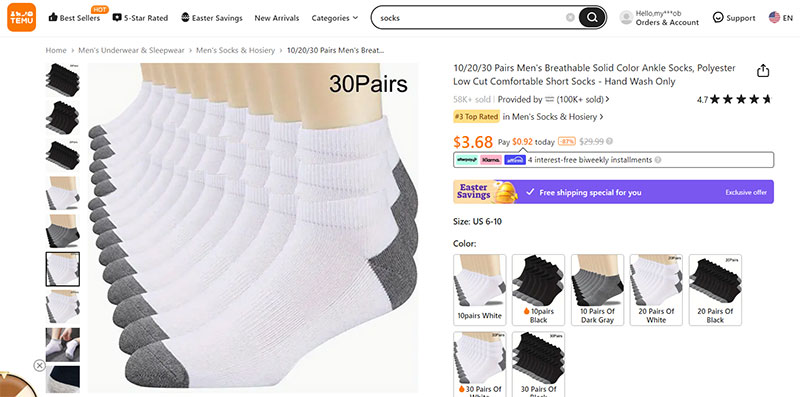Temu launched in August 2022 and quickly became the second-most popular shopping app in the US behind Amazon. From $5 shoes to a Nintendo Switch for only $7, Temu offers low prices that other marketplaces can’t compete with.
So is Temu a scam and is Temu safe?
In April 2023, Kim Kommando, a cybersecurity writer from USA Today, wrote a scathing review accusing Temu of collecting sensitive data from consumers and selling the info to China.
Then she went on to say, “Delete the app. The bargains are not worth it.”
I’ve been importing products from China for over 15 years and I will dissect everything you need to know about Temu, cut through the rumors, and get down to the hard facts.
Is Temu legit or is it just a glorified spy app from Chinese companies? And are the bargains too good to be true? Read on to find out!
Get My Free Mini Course On How To Start A Successful Ecommerce Store
If you are interested in starting an ecommerce business, I put together a comprehensive package of resources that will help you launch your own online store from complete scratch. Be sure to grab it before you leave!
What Is Temu?
Temu is a US-based online marketplace that offers extremely low prices on thousands of products shipped directly from China. The company is a subsidiary of PDD Holdings, a Chinese company which is publicly traded on the NASDAQ.
Temu is one of many Chinese companies trying to break into the American market. It’s technically an American company because it’s headquartered in Boston, Massachusetts. However, the company that owns Temu, PDD Holdings, is registered in the Cayman Islands and has other companies under it in China. So even though it looks American, Temu is in fact a Chinese company.
The name Temu means “Team Up, Price Down,” which reflects the company’s philosophy of reducing prices for its most popular products.
Temu relies on economies of scale to maintain low prices across the board. The more people who use Temu to buy a specific product, the cheaper the price for everyone.
Overall, the reviews for Temu have not been good.
As of 10/9/23, Temu has a review rating of 3.4 out of 5 stars on Trustpilot and 3.24 out of 5 stars on Sitejabber. In addition, Temu is not an accredited company by the Better Business Bureau and has a rating of C+.
Is Temu A Scam?
Temu is not a scam. It is a legitimate online shopping platform with real products. However, there are many customer complaints about late deliveries, incorrect orders, counterfeit items, and even items not delivered. Like any shopping marketplace, customers should exercise caution when buying on Temu.
So is Temu Safe? Purchasing from Temu is safe as the company provides a purchase protection program to protect buyers from fraudulent activities and damaged products. However, Temu is not an accredited company by the Better Business Bureau and has a rating of C+.
My Own Personal Experience With Temu
I’ve purchased many times on Temu in the past year and Temu is definitely not an outright scam. If you place an order, you will receive your products.
However, you may not receive exactly what you ordered (as pictured on the Temu website) and the quality will almost always be worse than you think.
For example, I ordered 30 pairs of socks recently for $3.68 and they arrived within 2 weeks in a heavily taped plastic bag. It was clear that someone just threw them in a leftover bag and taped it up for shipment.
The colors of the socks were slightly off but they looked 85% the same as the photo. However, these were the THINNEST socks that I’ve ever seen and they only lasted 3 washings before they got holes in them.
I’ve also made other purchases where the products were completely different than pictured on the website which I never bothered to return because it wasn’t worth my time.
The photos on the Temu website will always be better looking than what you will receive. If you consider getting slightly different or low quality products a scam, then Temu is a scam.
But in most cases, you’ll live with it because the prices are too low for it to matter. Read on if you are worried about Temu’s return policy.
How Does Temu Protect Its Users From Scams?
The Temu Purchase Protection Program provides coverage for items that are not as described in the listing, items that arrive in damaged condition, and items that get lost during shipping. Impacted customers can ship their item(s) back at no extra cost and receive a full refund on your items.
However, online reviews indicate that getting a refund from Temu can sometimes take a while, but refunds do in fact get issued.
Are there any reported scams related to Temu? While the Temu website and products are legitimate, some have accused Temu of stealing customer data.
Temu’s sister app, Pinduoduo, has faced allegations related to privacy and data security due to reported malware.
Also, there are cases of scammers using the site to scam potential customers. These include creating a fake Temu website, posing as Temu customer service or offering free stuff to phish for info, and taking advantage of Temu’s referral rewards system.
What Are The Risks Of Using Temu?
Below are some risks users should be wary of when using or shopping with Temu:
- Data handling practices: Temu’s parent company, Pinduoduo, has been accused of collecting user data and sharing it with the Chinese government. Temu has also been criticized for privacy concerns, which allows the app to collect a wide range of data about users, including their location, browsing history, and purchase habits.
- Low-quality goods: While the vast majority of Temu’s products are legitimate, there are many negative complaints about the quality of the products. Many customers report receiving items that are either damaged, defective, or break after just a few uses (especially with electronics). For example, a YouTuber Erin Lawrence shared her experience of buying earpods from Temu resembling the Airpods Pro from Temu. Unfortunately, they failed to pair with any device or play music.
- Delayed or No Refunds: There have been complaints on both Sitejabber and Trustpilot that mention Temu either refuses to refund items returned or refunds take more than 30 days (as stated in their refund policy).
- Slow Shipping: Products purchased from Temu are typically shipped from China. As a result, delivery times are long and never guaranteed. Customers might receive your products within 1 week or 2 months depending on the vendor since shipping from China is unpredictable.
- Non-Existent Items: Customers have reported undelivered packages or only receiving half or part of what they ordered.
So what steps can consumers take to ensure a safe transaction on Temu?
- Only shop on a secure network, such as your home Wi-Fi network. Avoid using public Wi-Fi networks, as they are less secure.
- Use a strong password and enable two-factor authentication (2FA) for your Temu account. This will help to protect your account from unauthorized access.
- Only shop from sellers with a good reputation and established track record. You can check a seller’s reputation by reading their reviews and looking at their star rating.
- Be careful about what information you provide to sellers. Never give out your full credit card number, Social Security number, or other personal information to a seller.
- Only pay through Temu. If a seller suggests paying outside of Temu’s platform, decline right away. Temu provides multiple payment options and uses SSL encryption to protect your payment information during transactions. You will not be protected by the buyer protection program if you do transactions outside of Temu.
- Inspect your purchases immediately and carefully when you receive them. Some customers reported receiving products that they did not order or were very different from what they saw in pictures online.
How Can Users Spot A Potential Scam On Temu?
Watch out for these red flags to avoid getting scammed on Temu:
- Products that are too good to be true. For instance, if you come across an electronic device priced significantly lower than its market value, but it claims to have top-tier features comparable to established brands, it might be a deceptive listing.
- Products that have no reviews, very few reviews, or fake positive reviews. A product without any reviews or with sparse feedback can be a red flag. Additionally, watch out for reviews that sound generic or overly positive without specific details about the product. Fake reviews can be crafted to boost a product’s credibility, so always look for genuine, detailed feedback.
- Sellers who have a poor reputation on Temu or other websites. Before making a purchase, it’s a good practice to check the seller’s reviews and rating. Avoid buying from sellers that have a history of negative feedback, unresolved disputes, or similar issues based on customer feedback on Temu.
- Sellers who ask you to pay outside of the Temu platform. One of the primary red flags is when a seller directs you to make payments outside the official Temu platform. Doing so can expose you to potential scams, as you might lose the protection and guarantees offered by Temu.
- Sellers who ask you to provide personal information that is not necessary to complete your purchase. Be cautious if a seller requests personal details that aren’t typically required for a transaction, such as your social security number or even bank details. Sharing such details can expose you to identity theft or other fraudulent activities.
The safest products to purchase on Temu are simple, everyday items, like non-electronic household items, fashion and clothing accessories, stationary and craft supplies, and other simple gadgets. These carry less risks of defect or damage.
Temu Reviews And Complaints
Temu has had its fair share of challenges and negative reviews. The negative reviews have prompted many to question “Is Temu a scam?”, anchoring the importance of customer caution while shopping on the platform.
As of 10/9/23, Temu has 2489 negative reviews on Trust Pilot and 577 negative reviews from Sitejabber.
31% of the Temu reviews on Trust Pilot are negative, earning it a 3.42 out of 5 star customer rating. Temu also has a rating of 3.3 stars on Sitejabber, with about 60.7% negative or neutral reviews in the past 12 months.
What are the common complaints about Temu? Overall, the majority of Temu complaints are about:
- Slow Delivery: This is due to extended delivery times, items being lost in transit, or difficulty tracking which can result in slow or even undelivered packages.
- Poor Quality Goods: The quality of goods don’t match up to the expectations set by the product listings. This includes products made of cheaper material, or not functioning as described.
- Poor Customer Service: Customers have reported difficulty in getting refunds or returns, or unresponsive customer service from the company.
- False Advertising: The images or descriptions of the products on the website do not accurately represent the actual items they receive.
How Does Temu Verify The Authenticity Of Its Sellers?
Temu will actually purchase random products from sellers to verify their authenticity. Failure to pass the random sample checks can result in the seller being kicked off the platform.
Temu also requires sellers to submit business licenses and tax identification for verification. They conduct background checks to identify high-risk sellers and perform regular audits on top vendors for platform policy compliance.
Vendors must maintain high standards regarding product quality, inventory, and shipping. Those with excessive customer disputes or complaints risk account suspension or termination.
This rigorous seller verification ensures that customers can trust the listings and prevents the sale of counterfeit or unsafe products.
Are The Products On Temu Good Quality?
Most of the complaints from Trustpilot, Sitejabber, and Better Business Bureau mention that the items received were of poor quality. Some products arrive with defects, while others break down after one or two uses.
Customers often report that the actual items differ significantly from their online images on Temu, or in some cases, they receive entirely different products.
Why Is Temu So Cheap?
Temu claims that their prices are low because they connect customers directly to suppliers in China. They also leverage social shopping with team purchasing to negotiate lower prices for consumers. Temu’s access to a deep network of merchants, logistics partners, and an established ecosystem of suppliers helps keep prices low as well.
Basically, they cut out the middleman, gather a bunch of orders of the same product from customers, and place large orders at cheap prices by leveraging economies of scale.
But experts believe that Temu is just a loss leader to gain market share for the app and to gather data for Temu’s real revenue source, information.
According to Juozas Kazuikenas of Marketplace Pulse, “there’s absolutely no way Temu runs a profitable retail business. They are effectively buying market share and hoping in the years to come that market share will stick.”
Why Is Temu So Popular?
Temu has become a very popular marketplace because of the value it provides to users. Temu is able to offer products at very low prices which has attracted over 100 million people accessing the app.
While some customers report low product quality, the majority of customers don’t have any issues with the products received. For a first-hand experience, you can go to Temu.com or download the Temu app directly from Google Play or the Apple App Store.
Temu’s Social Marketing Strategy
Temu has also been investing heavily into the influencer marketing space. Personally, I’ve been offered $1000 to publish a video on YouTube about Temu. I’ve also been offered hundreds of dollars to post a short TikTok. (Note: I’ve never ever accepted their money)
Recently, I published a video about Temu and the video was inundated with positive comments about the platform.
There were literally hundreds of people gushing about the Temu online shopping experience which made me suspicious. I’ve been creating content for a very long time and it’s rare to see so much enthusiasm about a shopping platform.
People are more likely to post comments when they are unhappy about a service, not when a service works as advertised.
As a result, I strongly believe that Temu has hired people to leave positive comments about their platform on all major social media outlets.
Temu is definitely spending a massive amount of money to promote their app.
Click Here If You Want $100 In Free Stuff From Temu
Is Temu Spying On You?
It is 100% true that the Temu app uses data collection to track your phone usage habits including your name, address, and phone number as well as any details about you such as your birthday, photo, and social media profiles.
You’re also giving up information about your phone’s OS, your IP address, GPS location (with permission), and all browsing data.
Temu collects data from your sessions and search history and monitors your activity and time on site. If you log in using social media, it will also collect your public profile information, posts and other interactions on the platform.
In addition, if you’re using the app on a mobile device, Temu may collect data about your device itself, like your device ID, model and manufacturer, operating system version, mobile network information and even your mobile phone number.
However, the data that Temu gathers is similar to what many other apps and online platforms do, including some of the biggest tech companies in the world.
The privacy policies of Facebook, Google, Amazon and other tech giants also make it clear that they collect vast amounts of information about their users.
The real question is whether your data is being sent to China. As mentioned earlier, Kim Kommando on USA Today said flat out:
- The prices are low because the goods are cheap.
- What you see isn’t necessarily what you get.
- Temu is a communist China based app and site.
- Temu monitors your activity on other apps, tracks your notifications, locations, and can potentially change the settings on your phone.
Is Temu Stealing Your Data And Sending It To China?
There is no evidence that Temu is sending your data to China. However PDD Holdings, Temu’s parent company, does not have a good track record when it comes to online privacy concerns.
According to CNN, the Pinduoduo app, Temu’s sister company, was caught with malware that exploited vulnerabilities in the Android operating system. Company insiders said the exploits were utilized to spy on users and competitors, allegedly to boost sales.
Mikko Hypponen, Chief Research Officer at WithSecure, was quoted as saying, “We haven’t seen a mainstream app like this trying to escalate their privileges to gain access to things that they’re not supposed to gain access to. This is highly unusual and it is pretty damning for Pinduoduo.”
These findings follow Google’s suspension of Pinduoduo from its Play Store in March of 2023, citing malware identified in various versions of the app.
An ensuing report from Bloomberg said a Russian cybersecurity firm had also identified potential malware in the app.
These vulnerabilities allow the app to gain full access to your contacts, calendars, photo albums, social media accounts, chats, and texts. In other words, almost everything on your phone.
CNN reports that “By collecting expansive data on user activities, the company was able to create a comprehensive portrait of users’ habits, interests and preferences, which allowed [Pinduoduo] to improve its machine learning model to offer more personalized push notifications and ads, attracting users to open the app and place orders.”
So does Temu steal sensitive data from your phone and send your data back to China? So far, there’s no evidence of it. But PDD Holdings has shown that they are capable of doing it.
Is Temu A Good Site To Buy From?
Having shopped on Temu, most of the products sold on the platform are cheap Chinese junk that isn’t branded. If you were to ever visit China, you’d see these types of cheap products being sold everywhere. They are not built to last.
Most of the sellers on Temu are not professional companies.
The merchants on Temu are what PDD Holdings calls “farmer merchants.” According to their SEC filing, “Small-scale farmers in China have traditionally relied heavily on layers of distributors to market and sell their products to the broader consumer base, which is highly inefficient. We believe our ‘team purchase’ model provides an alternative solution. The large demand helps farmers to directly sell to consumers without going through layers of distributors, thereby improving the overall supply chain efficiency and reducing cost.”
A farmer merchant is essentially like a mom and pop shop which is why quality varies so much on the Temu platform.
You get what you pay for. Don’t be dazzled by the low prices.

Ready To Get Serious About Starting An Online Business?
If you are really considering starting your own online business, then you have to check out my free mini course on How To Create A Niche Online Store In 5 Easy Steps.
In this 6 day mini course, I reveal the steps that my wife and I took to earn 100 thousand dollars in the span of just a year. Best of all, it's free and you'll receive weekly ecommerce tips and strategies!
Related Posts In Ecommerce Marketplaces
- Walmart Sells Out To China And Betrays US Sellers To Fight Temu
- Amazon Vs Walmart: Which Marketplace Is Better For Online Sellers?
- Is SSENSE Legit? My Review Of This Luxury Brand Platform
- Is GOAT Legit? Read This Review Before You Buy
- 14 Etsy Alternatives For Selling Crafts And Handmade Goods

Steve Chou is a highly recognized influencer in the ecommerce space and has taught thousands of students how to effectively sell physical products online over at ProfitableOnlineStore.com.
His blog, MyWifeQuitHerJob.com, has been featured in Forbes, Inc, The New York Times, Entrepreneur and MSNBC.
He's also a contributing author for BigCommerce, Klaviyo, ManyChat, Printful, Privy, CXL, Ecommerce Fuel, GlockApps, Privy, Social Media Examiner, Web Designer Depot, Sumo and other leading business publications.
In addition, he runs a popular ecommerce podcast, My Wife Quit Her Job, which is a top 25 marketing show on all of Apple Podcasts.
To stay up to date with all of the latest ecommerce trends, Steve runs a 7 figure ecommerce store, BumblebeeLinens.com, with his wife and puts on an annual ecommerce conference called The Sellers Summit.
Steve carries both a bachelors and a masters degree in electrical engineering from Stanford University. Despite majoring in electrical engineering, he spent a good portion of his graduate education studying entrepreneurship and the mechanics of running small businesses.

















